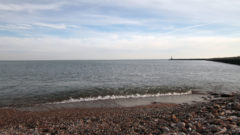Variable fellowship brings learning and results for all involved
In the roughly six months she has been the 2023 Water Science Policy Fellow, Sarah Gravlee’s throughline has been science, in many forms. It’s been her head-down task to complete a literature review of the hurdles facing public water systems. Gravlee’s been checking for lead water-service lines to a location where someone has applied for day care certification. She’s been fielding phone calls from people across Wisconsin with questions about contaminants in their private wells. There was also the meth house.

“I joined one of our toxicologists in the field a few months ago,” Gravlee said. “We went to a home where someone used to smoke meth. We tested it to ensure it was safe for children to resume living there. It passed with flying colors. Well, not flying colors. There was a negligible amount of residue detected. We used a test similar to a PCR test (a DNA polymerase chain reaction test). We wiped windowsills down and mixed these samples with a chemical solution. The solution was dropped on a tester that uses color indication to quantify the meth levels.”
Gravlee’s two-year fellowship is supported by the Wisconsin Department of Health Services (DHS) and the University of Wisconsin Water Resources Institute (WRI). Her indisputably wide range of tasks in such a short amount of time is precisely the intention of the sponsoring organizations.
Jennifer Hauxwell, WRI associate director and a co-mentor for Gravlee, noted the initial call for applicants stated that the fellow would capitalize on many opportunities to help communities facing hazardous conditions.
The mentor team is rounded out by Drs. Roy Irving and Sarah Yang at DHS and Environmental Health Capacity Evaluator Jacquie Cronin, also at DHS. This fellowship/co-mentoring model, Hauxwell said, serves the interests of all three participants, the university, agency and fellow.
The university, through WRI, contributes to workforce development—training the next generation of scientists to do community-engaged science. Then, “Agencies make progress on a water challenge for the people of Wisconsin and attract talent for a project, and potentially longer-term positions.” Hauxwell continued, “Fellows apply technical skills to real-world problems, learn how to engage partners and communities and are invited to step outside of a comfort zone.”
For Gravlee’s part, she’s ticking the boxes Hauxwell described. “I like working at the intersection between water and public health. I’ve enjoyed fielding questions from the public about water contaminants, sitting in on meetings about newly identified water contamination, and assisting in projects focused on reducing Wisconsin’s environmental health hazards. I’ve learned a lot about how DHS functions and collaborates with its partners, including the DNR, DATCP (Department of Agriculture, Trade and Consumer Protection), UW-Extension and local health departments.”
She also offered: “I know the DHS fellowship is a little different than other fellowships that are focused on a singular project. I love that I have a variety of tasks, so every day is different. DHS has been great about providing professional development opportunities and involving me in work that is in line with my interests.”
As for longer-term positions that could result from a fellowship, Gravlee isn’t yet sure of her future direction. “I never pictured myself working in public health before this fellowship, but I think it’s been a good fit. I could see myself continuing environmental health work or transitioning to work focused specifically on contaminated water resources.”
In the meantime, she’s soaking up the experience and providing solid contributions to, for example, implementing a wide-ranging Centers for Disease Control and Prevention grant on building environmental health capacity. According to the DHS, 83% of community water systems in the state serve small populations, 3,330 or fewer people. Through a mini-grant program on which Gravlee works, local public health departments and tribal health agencies are getting assistance to address health hazards such as high nitrate levels, flooding and contaminants.
Based on that grant, Gravlee has been preparing for a conference presentation in March. It will focus on her and Cronin’s environmental health capacity support for local health departments investigating and resolving water-related issues. The pair is refining a presentation they previously delivered at a statewide conference in the fall.
The post Variable fellowship brings learning and results for all involved first appeared on WRI.News Release | WRI
https://www.wri.wisc.edu/news/4058-2/


